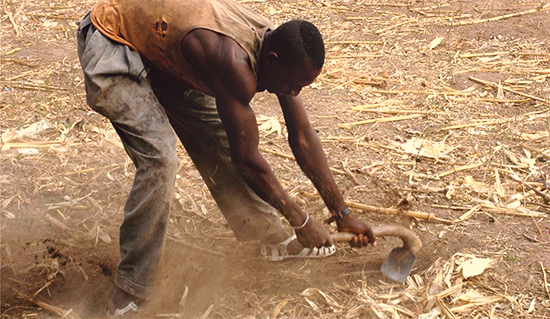
August-
September 2017
Church and Home
------------------
|






Passing the Daba
By Clint Morgan
Cultures often complicate matters, such as determining when a child is an adult. Often, the child thinks he is ready to be on his own long before the parents do. Generally, this leads to conflict in the family. Some children go out on their own in spite of the reasoning or protests of the “not so smart” adults. On the other hand, some parents may push their children to take on life without having properly prepared them to do so. No matter how you look at this, variables make this process a tricky business.
Among the Lobi people of Côte d’Ivoire, parents face similar challenges. The Lobi have a particular “rite of passage” that signals to their son, and the community, that he has liberty to leave his father’s compound and go out on his own.
I’m not convinced the Lobis are much better at this transition than we are. The fact is Lobi parents often keep their sons close to home long past the time they should be liberated. As long as a son is living in his father’s compound, not necessarily in his father’s house, all the work he does in the fields helps feed the whole family. It doesn’t matter if he is married and has children, he is culturally bound to stay under his parents, control until his father decides it is time for him to leave the compound and go out on his own.
The rite of passage is relatively simple, but very important in the world of the Lobi. When the father determines the time is right, he will present his son a “daba” prepared specifically for the occasion. A daba is a short-handled hoe used for work in the fields. With this tool, the Lobis clear the ground, prepare the field for planting, and work constantly to battle the weeds that infest their crops.
After receiving the daba, the young man can leave his father’s courtyard, build his own home, plant his own fields, and carry on the Lobi tradition of passing the daba to his own sons when he determines the time is right.
Church leaders often commit the same error in determining when their members are ready to take on a task. In fact, some Christians never take any responsibility in their local church. I am convinced ALL believers should have a role within their local assembly. Leaders should teach, train, and encourage church members to play their God-designed role in going into the “fields that are white unto harvest.” Church leaders need to “pass the daba” to mature believers and lead the local congregation to send them into the fields.
A study of Acts 13:1-3 gives a biblical image of what a Lobi might view as a spiritual rite of passage or “‘passing of the daba.” Maybe our churches need to formalize our recognition of believers as they take on their role in the “fields that are white unto harvest.”
Acts 13:1-3—Now there were in the church that was at Antioch certain prophets and teachers; as Barnabas, and Simeon that was called Niger, and Lucius of Cyrene, and Manaen, which had been brought up with Herod the tetrarch, and Saul. As they ministered to the Lord, and fasted, the Holy Ghost said, Separate me Barnabas and Saul for the work whereunto I have called them. And when they had fasted and prayed, and laid their hands on them, they sent them away.
About the Writer: Clint Morgan has been general director of International Missions since 2011. Learn more: www.fwbgo.com.
|
|

